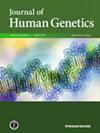短读测序未解决的肌肉疾病特异性遗传诊断策略。
IF 2.5
3区 生物学
Q2 GENETICS & HEREDITY
引用次数: 0
摘要
近年来,全外显子组和全基因组测序越来越多地应用于肌肉疾病的遗传诊断。然而,标准的短读测序往往无法检测到一些遗传性肌肉疾病的致病变异,如Duchenne/Becker肌营养不良症(DMD/BMD)、面肩肱肌营养不良症(FSHD)、眼咽肌营养不良症(OPMD)和眼咽远端肌病(OPDM)。这篇综述概述了这些条件的遗传诊断方法,特别侧重于遗传诊断的新分析方法。本文章由计算机程序翻译,如有差异,请以英文原文为准。
Disease-specific genetic diagnostic strategies for muscle diseases unresolved by short-read sequencing.
In recent years, whole-exome and whole-genome sequencing have been increasingly applied for the genetic diagnosis of muscle diseases. However, standard short-read sequencing often fails to detect pathogenic variants in some inherited muscle diseases, such as Duchenne/Becker muscular dystrophy (DMD/BMD), facioscapulohumeral muscular dystrophy (FSHD), oculopharyngeal muscular dystrophy (OPMD), and oculopharyngodistal myopathy (OPDM). This review outlines the genetic diagnostic approaches for these conditions, with a particular focus on novel analytical approaches for genetic diagnosis.
求助全文
通过发布文献求助,成功后即可免费获取论文全文。
去求助
来源期刊

Journal of Human Genetics
生物-遗传学
CiteScore
7.20
自引率
0.00%
发文量
101
审稿时长
4-8 weeks
期刊介绍:
The Journal of Human Genetics is an international journal publishing articles on human genetics, including medical genetics and human genome analysis. It covers all aspects of human genetics, including molecular genetics, clinical genetics, behavioral genetics, immunogenetics, pharmacogenomics, population genetics, functional genomics, epigenetics, genetic counseling and gene therapy.
Articles on the following areas are especially welcome: genetic factors of monogenic and complex disorders, genome-wide association studies, genetic epidemiology, cancer genetics, personal genomics, genotype-phenotype relationships and genome diversity.
 求助内容:
求助内容: 应助结果提醒方式:
应助结果提醒方式:


